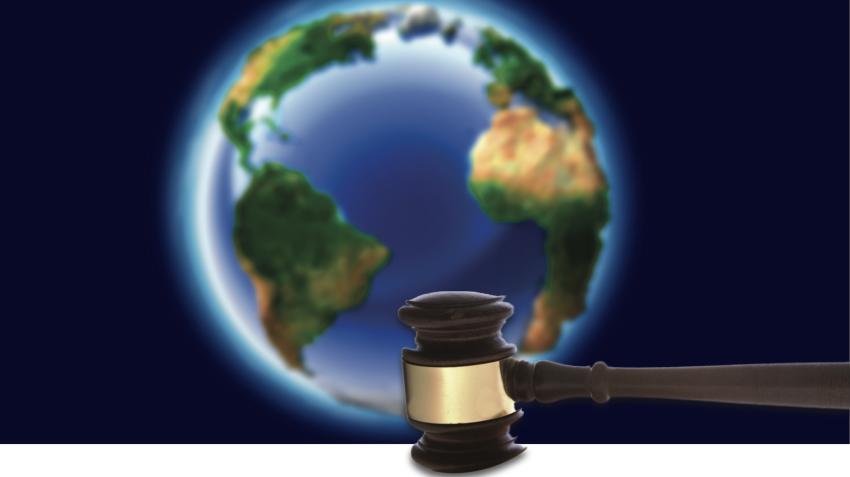
Collective Action:The Private Sector's Interest and Role in Collaborating to Address Water Challenges in Urban and Rural Areas
Aging infrastructure and a lack of government management capacity are leading to insufficient and inconsistent water deliveries, sometimes stalling industrial activity. As these challenges and demands escalate, governments tighten controls on water use and wastewater discharge as a means of mitigating depletion and degradation of resources, while communities and civil society groups are more likely to hold companies accountable for unsustainable practices.

Water Cooperation to Cope with Twenty-First Century Challenges
Current United Nations predictions estimate that the world population will reach 9 billion in 2050. The exponential growth in population and the more intensive use of water per capita are among the leading key drivers behind hydrologic change and its impact. It is a huge challenge on an already resource-limited planet to meet the various needs of the people, especially of those who already lack access to clean water.
The Role of the UN in Promoting the Rule of Law: Challenges and New Approaches
The rule of law is the bedrock upon which the United Nations is built. On the international stage, it is fundamental to peace and stability.

The International Network to Promote the Rule of Law: A Platform to Promote Justice and Security in Conflict-Affected States
The challenges that national governments and the international community are facing in promoting the rule of law in the aftermath of conflict are immense: local communities expect their governments to establish justice and security immediately while also bringing back a sense of normalcy to their lives, and international donors expect that if they provide resources to governments and local non-governmental organizations, their investment will yield quick impacts and rule of law gains.

Meeting the Challenges of Delivering Justice on the Ground
Around the world in the past decade, there has been a growing understanding of the importance of strong justice and security institutions in building stability and sustained economic development in conflict and post-conflict societies. As a result, we have seen rising demand for United Nations efforts to strengthen the rule of law in post-conflict and crisis situations.

Establishing Effective Accountability Mechanisms for Human Rights Violations
Rule of law and institutional reform cannot start with a clean slate. Understanding the patterns of past human rights violations and ending impunity for the worst violations are indispensable for successful transformative processes. At the core of any effort to establish accountability are three indispensable and interlinked rights: the right to truth, the right to justice, and the right to an effective remedy and reparation.

Justice: What We Need in a Post-2015 World
Look around us, instructed the village chief in Small Sefadu, a tiny community in the eastern reaches of Sierra Leone and home to some of the country's biggest diamond mines. Together we survey the scene: a cratered dirt road is punctuated by burned-out houses, which is a signature reminder of the marauding rebels who took over the town during Sierra Leone's 11-year civil war.

Justice and Development: Challenges to the Legal Empowerment of the Poor
We have made great strides in reducing poverty and enabling human development. Ever since poverty trends began to be monitored, the number of people living in extreme poverty and poverty rates declined in every developing region, including in sub-Saharan Africa.

The Role of the International Criminal Court in Ending Impunity and Establishing the Rule of Law
The ICC contributes to the fight against impunity and the establishment of the rule of law by ensuring that the most severe crimes do not go unpunished and by promoting respect for international law. The core mandate of the ICC is to act as a court of last resort with the capacity to prosecute individuals for genocide, crimes against humanity and war crimes when national jurisdictions for any reason are unable or unwilling to do so.

Upholding the Rule of Law at the International Level: The Role of the International Court of Justice
The International Court of Justice (ICJ) is the principal judicial organ of the United Nations. Its seat is at the Peace Palace in The Hague, Netherlands.

Rule of Law and Democracy: Addressing the Gap Between Policies and Practices
The Declaration adopted on 24 September 2012 by the United Nations General Assembly at the High-level Meeting on the Rule of Law at the National and International Levels reaffirmed that human rights, the rule of law and democracy are interlinked and mutually reinforcing and that they belong to the universal and indivisible core values and principles of the United Nations.

Increasing Women's Access to Justice in Post-Conflict Societies
In the past three decades, significant gains have been made in building an international justice architecture which includes accountability for sexual and gender-based crimes. The prosecution of these crimes serves as an important signalling of a break with the past, an assertion of the equal rights of women and an international willingness to protect these rights. For the first time in history, these significant advances have made it possible to prosecute sexual and gender-based violence in conflict.

Delivering Justice on the Ground: The Challenges of Fighting Corruption at the National and International Levels
On the occasion of the first High-level Meeting of the General Assembly on the Rule of Law at the National and International Levels on 24 September 2012, the Heads of State and Government and heads of delegation adopted an important political Declaration by consensus.

Reggae, A Force for Dialogue
Reggae music blew up with a bang to the resistance movement against imperialism in the 1960s. It started in Kingston, Jamaica, and has conquered the world and acquired an emblematic Rastafarian character, but an understanding of its fundamental nature is still lacking.

Bringing Human Passion into Sustainability Education and Bridging Cultures
In reality, the creative and destructive sides of human passion are deeply integral to what it means to be human, but as an educator I increasingly wonder how can we differentiate between the two sides?
